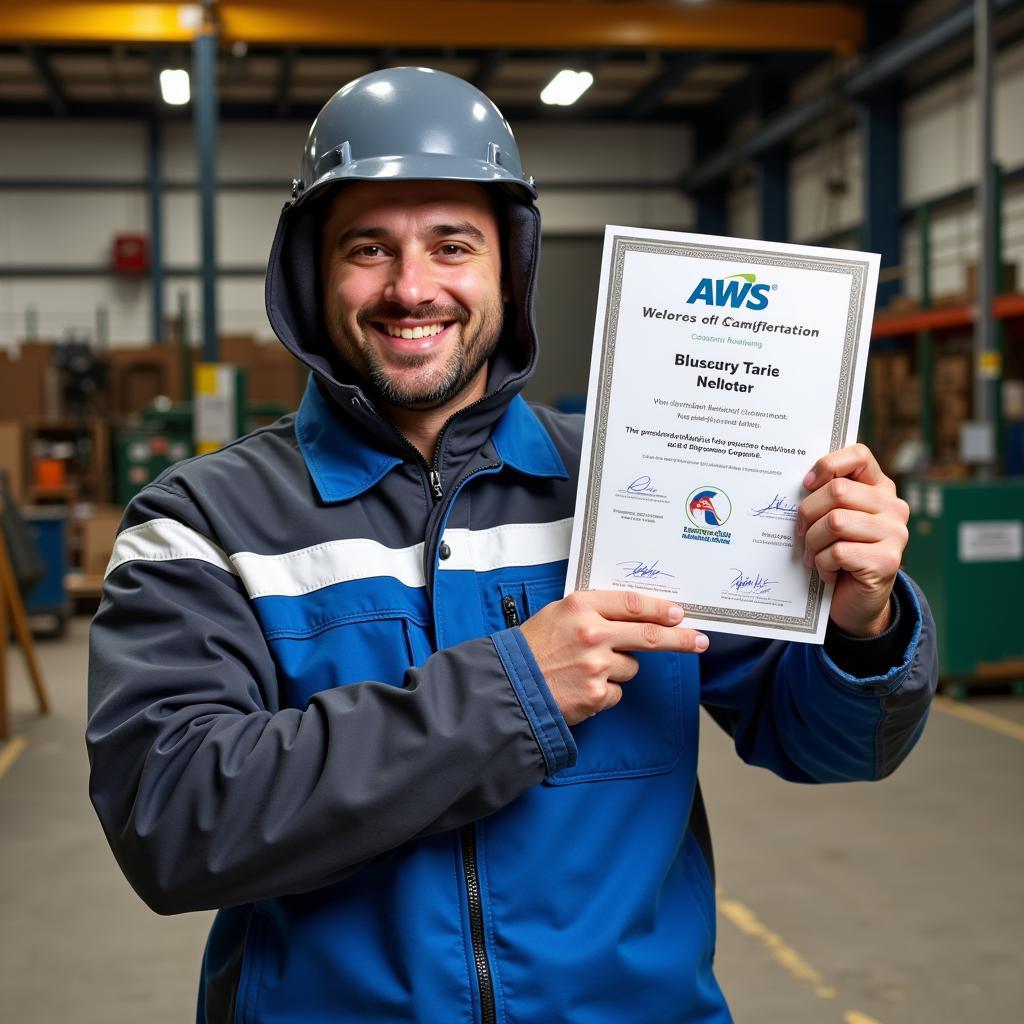The American Welding Society (AWS) codes are the backbone of welding safety and quality in countless industries. These codes, developed and maintained by the AWS, provide detailed guidelines for every aspect of welding, ensuring structural integrity and minimizing risks. Whether you’re a seasoned welder or new to the field, understanding these codes is crucial.
Why Are American Welding Society Codes Important?
Welding isn’t simply about joining two pieces of metal; it’s a complex process with the potential for serious consequences if not executed properly. AWS codes offer a standardized framework that promotes safety, consistency, and reliability in welding practices.
They cover a wide range of aspects, including:
- Welding processes: From traditional arc welding to advanced laser techniques, each process has its own set of guidelines.
- Materials: AWS codes specify acceptable materials for different applications, ensuring compatibility and preventing failures.
- Welder qualification: Certification programs based on AWS codes verify a welder’s skills and knowledge, assuring employers of their competency.
- Inspection and testing: Codes outline procedures for inspecting welds, identifying defects, and ensuring the final product meets the required standards.
Navigating the World of AWS Codes
With numerous codes covering various welding aspects, finding the right one can seem daunting. Here’s a simplified approach:
- Identify the welding process: Determine the specific welding method used for your project.
- Determine the base metals: Knowing the materials being welded is essential for selecting the appropriate code.
- Consult the AWS code chart: AWS provides comprehensive charts that list codes based on the process and materials involved.
For instance, if you’re working on a structural steel project using the shielded metal arc welding (SMAW) process, AWS D1.1: Structural Welding Code — Steel is the relevant code to follow.
The Benefits of Adhering to AWS Codes
Implementing AWS codes offers numerous advantages:
- Enhanced safety: By following standardized procedures, risks associated with welding, such as fumes, burns, and electrical hazards, are significantly reduced.
- Improved quality: Consistent adherence to codes results in higher quality welds, minimizing defects and rework.
- Increased productivity: Standardized procedures streamline the welding process, boosting efficiency and reducing production time.
- Reduced costs: By preventing defects and rework, AWS codes help save on material costs and labor.
- Enhanced credibility: Compliance with recognized industry standards like AWS codes strengthens a company’s reputation and fosters trust with clients.
 Welder Receiving AWS Certification
Welder Receiving AWS Certification
American Welding Society Certification: A Mark of Excellence
The AWS offers a range of certification programs designed to validate a welder’s skills and knowledge based on specific codes. These certifications are highly regarded in the industry and serve as a testament to a welder’s competency.
american welding society certification lookup
To obtain an AWS certification, individuals must pass both a written exam and a practical welding test, demonstrating their understanding of the relevant codes and their ability to apply them in real-world scenarios.
The Role of AWS Codes in a Globalized World
As industries become increasingly globalized, the importance of standardized welding practices cannot be overstated. AWS codes provide a common language for welding professionals worldwide, ensuring consistency and quality regardless of location.
Many countries have adopted AWS codes as their national standards, further solidifying their significance in the global welding community. This widespread acceptance facilitates international trade and collaboration, as companies can rely on a shared understanding of welding best practices.
Conclusion
American Welding Society Codes play a vital role in ensuring the safety, quality, and reliability of welded structures across industries. By understanding and adhering to these codes, we contribute to a safer, more efficient, and interconnected world. Whether you’re a welder, inspector, engineer, or simply someone who relies on welded products, appreciating the significance of AWS codes is crucial.
Let’s continue to strive for excellence in welding, guided by the principles of safety, quality, and standardization that AWS codes embody.
FAQs
1. How often are AWS codes updated?
AWS codes undergo regular revisions to incorporate the latest technological advancements and industry best practices. Typically, codes are reviewed and updated on a three-year cycle.
2. Where can I purchase AWS codes?
AWS codes can be purchased directly from the American Welding Society website or through authorized distributors.
3. Are there online resources available for understanding AWS codes?
Yes, the AWS website offers a variety of resources, including online courses, webinars, and FAQs, to help individuals understand and interpret welding codes.
4. Is AWS certification mandatory for all welders?
While not always mandatory, AWS certification is often a requirement for employment, especially for projects governed by specific codes.
5. What is the difference between AWS and american society of structural engineers?
While both organizations are involved in the construction industry, the AWS focuses specifically on welding, while the American Society of Structural Engineers (ASCE) deals with broader aspects of structural engineering.
For further information and support, please contact our 24/7 customer service team:
Phone: 02043854663
Email: [email protected]
Address: Khu 34, Bac Giang, 260000, Vietnam
You can also find more information on related topics on our website:
Let’s work together to build a safer and more peaceful world!